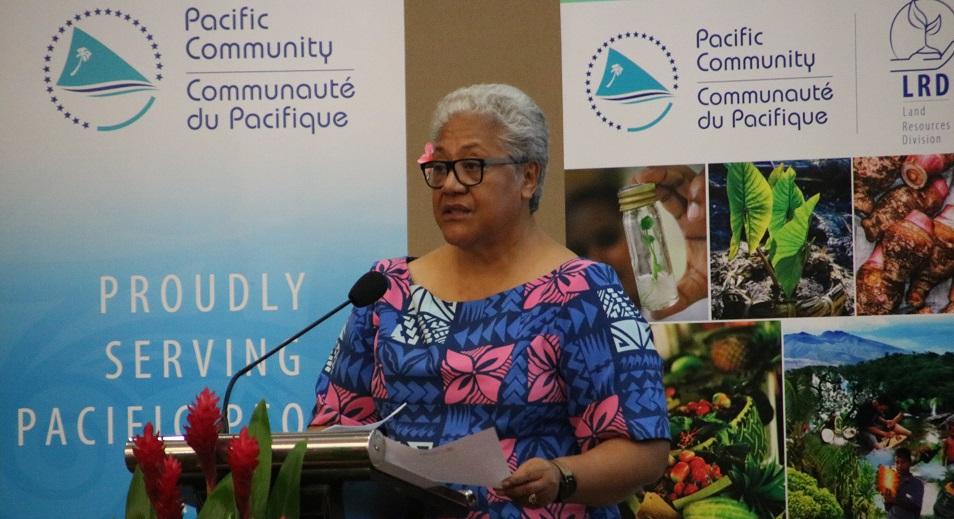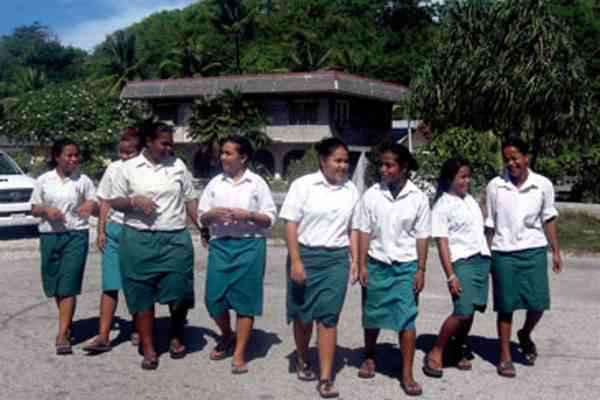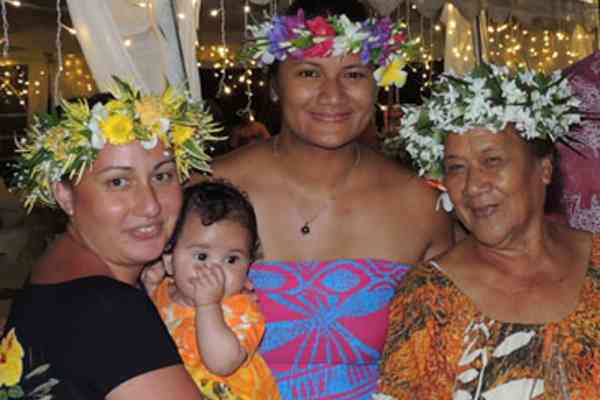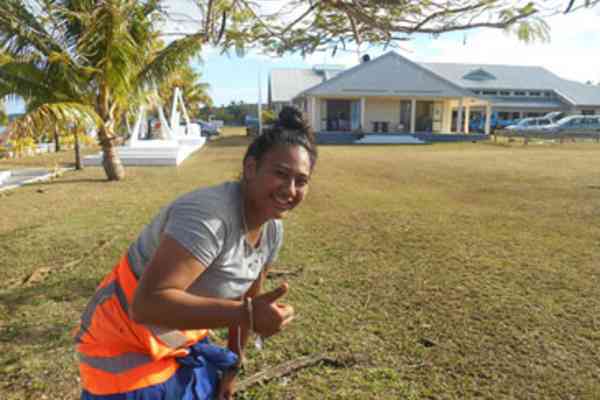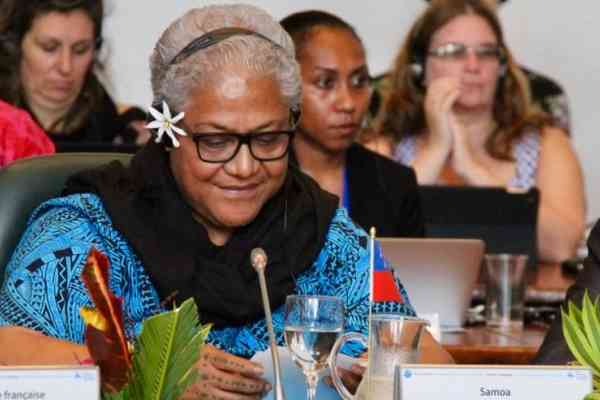Check against delivery
KEYNOTE ADDRESS BY THE DEPUTY PRIME MINISTER, GOVERNMENT OF SAMOA, HONOURABLE FIAME NAOMI MATA’AFA
LAUNCH OF THE REPORTS OF THE COUNTRY GENDER ASSESSMENTS IN AGRICULTURE & RURAL SECTORS (CGA-ARS)
___________________________________________
The Ministers of Agriculture and Forestry
Cabinet Ministers of the Government of Samoa
Heads of Agriculture and Forestry
The FAO Sub-regional Coordinator for the Pacific, Ms Eriko Hibi
The Deputy Director General of SPC, Dr Audrey Aumua
The Permanent Secretary, Ministry of Agriculture and Livestock, Government of Solomon Islands
Our woman farmer/ businesswoman and member of the Pacific Island Farmers Organisation Network, Leaupepe Lasa Tua’ifaiva Aiono
Representatives or regional organisation and development partners
Ladies and Gentlemen,
This evening culminates a series of technical discussions that have taken place as part of the agenda of Heads of Agriculture and Forestry on day 1 of your meeting; and although this is a side event, the concluding conversation of the day is perhaps quite appropriate and relevant given the nature and realities of women in agriculture in the Pacific.
I want to begin by reflecting on the broader status of gender equality in our region, in order to provide some context leading to the discussion on women’s role in agriculture. This year marks 25 years since the Pacific region adopted the Pacific Platform for Action on the Advancement of Women and Gender Equality in preparation for the Beijing Conference in 1995 which saw the adoption of Beijing Declaration and Platform for Action. Next year is the 25th Anniversary of this global commitment.
Since the adoption of these instruments, we have made some progress on the advancement of women and gender equality, and there is consensus that sustainable development won’t be achieved if half the population – girls and women – are not considered or excluded. In the area of women’s economic empowerment, there are improvements in women’s access to financial services, including credit and savings, especially for women in rural areas; and there is also increased recognition of the value of women’s unpaid work and its significance. Much of this unpaid work involves the production and preparation of food for their families.
In some of our countries there are now more girls than boys completing senior secondary school and there have also been some gender specific interventions to support education and learning – for example, gender policies in ministries of education, and the integration of human rights in the school curriculum. In the health sector, we have seen some progress in access to skilled medical personnel including birth attendants and more broadly, access to health facilities. For gender based violence, we are seeing more support for survivors of violence, although more help and services are needed; and there is now a wider range of programmes for young women’s empowerment. At the policy level, 14 of our countries and territories now have a national gender policies, although one thing that is common across these policies is they are all under resourced.
On women in political leadership, the Pacific has the lowest representation of women in national parliaments and local governments globally; making up just 18 percent of positions. The economic empowerment of women is severely constrained by compounding and intersecting patriarchal barriers including discriminatory policies and legislation, as well as access to economic opportunities and decision making, to name a few. Gender inequality in the region is also manifested in the high prevalence rates of violence against women – with women in some PICs experiencing the highest rates of intimate partner violence in the world. Ladies and gentlemen, that more broadly describes where we are in terms of some advances and challenges for gender equality in our region. The data shows that while access to education has improved, a high proportion of our young people are unemployed, and young men in particular do not see the primary sector as a viable small business or career opportunity; and view it as a pale choice in comparison to their aspirations of getting a well-paid ‘white collar’ office job. How do we turn this around?
This side event launches the Country Gender Assessments of Agriculture and the Rural Sectors (CGA-ARS) conducted in five Pacific countries, namely Fiji, Samoa, Solomon Islands, Tonga and Vanuatu. Led by the Pacific Community – SPC, in collaboration with FAO, the studies sought to improve understanding of gender perspectives of agriculture and rural sectors in order to develop effective strategies to support food security for Pacific people. As we know, throughout the Pacific, women play a leading role in agricultural production whether it might be subsistence farming to feed their families or growing cash crops to earn an income; and women’s labour in agriculture is a crucial part of food production and consumption in our communities.
A literature review undertaken in 2012 on Rural Pacific Island Women and Agriculture showed that the ways in which our Pacific women participate in agriculture vary by island and local cultural norms, yet women’s critical contributions in planting, tending, and harvesting crops and edible marine life sustain the majority of families throughout the region.
Despite these findings about women’s prominent role in agriculture, research also indicates that women continue to be constrained by unequal access to land; limited access to training, credit, and job opportunities compared with their male counterparts, as well as an unequal time burden in which women are expected to engage in agriculture on top of their normal household responsibilities. Some of these challenges are also aligned with the findings of the assessments in the 5 countries that you will hear more about later in the discussion.
The theme for the Pacific Week of Agriculture is “Enhanced Partnerships for Sustainable Agriculture and Forestry Systems in the Pacific”. From a gender perspective, the increasing global concerns and our own challenges at regional and national level for food security is becoming more urgent due to the impacts of climate change.
Ladies and gentlemen, women are disproportionately affected by the impacts of climate change and because of that, it is important for us to assess the gendered aspects of agriculture and rural life on an ongoing basis as part of our work, within the spirit of durable and sustainable partnerships applied in the context of the SAMOA Pathway, in line with the theme for the Pacific Week of Agriculture.
As heads of agriculture, we need to make sure the assessments support the goals and objectives in our gender and agriculture strategies, to support women’s roles in agriculture; and to eliminate barriers that hinder their potential and maximise our capacity as a collective to promote sustainable agriculture and food security. One thing that we know from experience is, advancing our gender outcomes as a region and as national governments is not the job of one organisation or Ministry or sector. It is the collective responsibility of all across Government and at all levels, with partnerships with the private sector and civil society organisations.
Gender equality is not just about women; it is about men and women and boys and girls of all diversities and therefore it cannot be left to the Ministries of Women alone to pursue this work. For the Agriculture sector, the launch of these gender assessments in agriculture reflects a strong recognition of the need to apply a gender lens to our work, and we will look to Fiji, Samoa, Solomon Islands, Tonga and Vanuatu to take the lead in translating these findings into concrete policies and action to advance the role of women in agriculture.
There is clear evidence that food and nutrition security and other benefits such as poverty reduction and increased socio-economic wellbeing are within reach when we use a gender lens to make sure the whole population is engaged in the primary sector. Commodity subsidies, such as those for copra in some countries for copra, are being used effectively to increase household incomes. The production and sale of handcrafts is an increasingly important source of household income with all family members involved. We need to increase our focus and efforts to ensure that women are part of the solution because unlocking women's power is a powerful catalyst for sustainable economic growth; and in our Pacific region the agriculture, fisheries and forestry sector is the foundation of our economies; not only in the direct value of food and other commodities produced, exported and so on but indirectly in the local food and delicacies that visitors and tourists consume and enjoy, as well as the handcraft products they purchase and so on.
I want to acknowledge the leadership of SPC in supporting the advancement of gender equality in the Pacific through their work on gender policies, gender mainstreaming and the production of gender statistics and analysis. The conduct of gender assessments in agriculture launched today is part of SPC’s gender analysis and gender mainstreaming work and it provides the evidence and knowledge our governments need to inform policies and decision making across sectors. It also provides information to help all of us understand the gender dimensions of development across the different sectors through the application of people centred approaches in our scientific and technical programmes in agriculture, climate change, fisheries and so forth. I also congratulate FAO for its leadership role globally on supporting food security and in ensuring that small islands states have the capacity to lead sustainable agriculture and food security.
Ladies and gentlemen, I thank you all for your participation this evening, I wish you al a successful and fruitful Pacific week of agriculture; and it is my pleasure to open this side event and to launch the 5 reports on Country Assessments in Agriculture and Rural Sectors. I wish you all a pleasant evening, soifua ma ia manuia!
__________________
